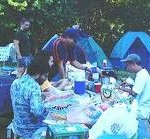 As discussed in more than one occasion, having water is crucial. But often find water along the way, and therefore we must set our stops, both to collect water to rest, at least in those points (abastecimietno of water) under compulsion (as well kill two birds with one stone .)
As discussed in more than one occasion, having water is crucial. But often find water along the way, and therefore we must set our stops, both to collect water to rest, at least in those points (abastecimietno of water) under compulsion (as well kill two birds with one stone .)
This is not an excuse for not carrying a reserve of water always personal. These places, therefore, must be seen as places to “refuel” our water, not just to drink water and follow the road without any reservation carry the liquid element.
Also, consider who (is drinking) water naturally does not like the stomach of many people not accustomed to chlorinated water than their homes, or commercial bottled mineral water. And although the effects of this natural water intolerance (usually diarrhea) are often not seen immediately but over the medium term, sometimes the refusal is a matter of taste and the person may refuse to drink water directly … but at the same time not have taken the precaution of bringing water with you because “nobody told him.” It is then that the guides or guardians always carry at least some water “the city” in reserve for cases like these.
For ecological reasons, as detailed elsewhere, it is best to stop right on the banks of rivers, especially in high traffic locations. So we should make stops near watercourses, but at least 50 or 100 meters of them.
As the resting place itself, besides being a place preferably near a water source (essential for long breaks and lunch) is to choose a place that does not hinder the passage to other climbers, hikers or hikers who might pass through the place while we are resting. This place must be as protected against potential natural hazards (landslides, avalanches, etc.) Protected from inclement weather: the sun in summer and winter wind (or according to prevailing weather conditions) and not be stopped too long to avoid “cooling” (muscle) too, and does not cost then resume the activity.
Finally, remember that the need for more or less water in our bodies is determined by the effort required, and climate: the greater physical effort, and equally, the greater the heat, wind or greater, the greater the dehydration suffered . The water bearing or load up at every stop, depend on these variables, always taking a rest from reserves will not use, and that will be for potential emergencies and first aid.




Leave a Comment